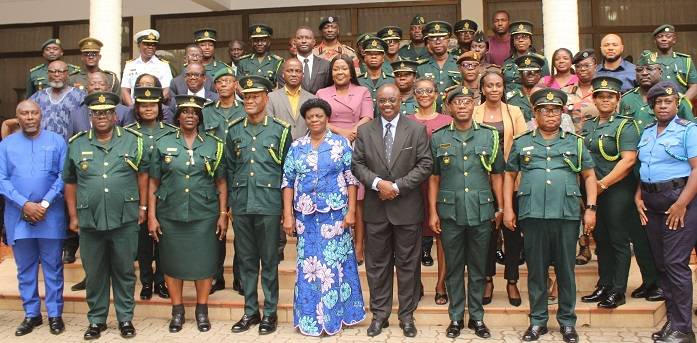
A five-day Senior Leadership and Management workshop designed to equip selected security agencies in enhancing law enforcement in Ghana, opened in Accra, on Monday.
The training programme, organised by the Ghana Immigration Service (GIS) in collaboration with the Commonwealth Secretariat, United Kingdom (UK), aimed at providing security agencies with skills in organisational leadership, strategic planning, conflict management, ethics and professionalism.
The participants were from the GIS, Ghana Police Service, Ghana Armed Forces, Ghana Navy, Ghana Prisons Service, Ghana National Fire Service, and Ghana National Security.
Opening the event, the Chief Director of the Ministry for The Interior, Mrs Adelaide Anno-Kumi, said the training represented a significant commitment in enhancing skills and knowledge of security agencies, “to foster a culture of continuous improvement.”
“As a ministry, we understand the vital role you play in ensuring the safety, security and wellbeing of the citizens.”
“It is through such initiative like this, that we equip ourselves with knowledge and skills needed to face the challenges of today and prepare the opportunities for tomorrow,” she added.
Mrs Anno-Kumi indicated that the challenges of the ‘changing world’ required that the security agencies adopt innovations and collaborate effectively with each other.
The training, she emphasised had been designed to sharpen the skills and expertise of security agencies to empower them with tools and insights necessary to operate more effectively in their various areas of operation.
“I encourage each one of you to fully engage with the programme, seize the opportunities it presents and collaborate with your fellow participants,” she said.
The Head of Public Sector Governance, Commonwealth Secretariat, UK, Professor Roger Koranteng, said effective leadership was an integral part to organisational effectiveness.
He noted that “effective leaders create positive organisational culture, strengthen motivation, clarify mission and organisational objectives and steer organisations to more productive and high performing outcomes to ensure the smooth and effective management of organisational development.”
Prof. Koranteng said leadership was key in producing greater intervention base result, adding that leaders of organisations must become prudent to influence, involve and support those they were leading.
He said the programme was intended to equip participants with innovative skills, to effectively contribute to manage their organisations to achieving their mandate.
The Comptroller-General of Immigration, Mr Kwame Asuah Takyi, said systematic collaborative learning helped to consolidate experiences and unique knowledge to strengthen individual organisations.
He said throughout his tenure, strengthening bond with sister security organisations and key stakeholders had been his priority, adding “bringing senior management members from the various oganisations to learn, share varied prospective and be exposed to new ideas is another innovative way of solidifying this relationship which is key in marinating a robust national security.”
The Comptroller-General commended the Commonwealth Secretariat for supporting the programme, and expressed optimism that the initiative would better equip the security agencies with the techniques, tools and insights needed to excel in the critical role of governance and leadership.
BY VIVIAN ARTHUR



